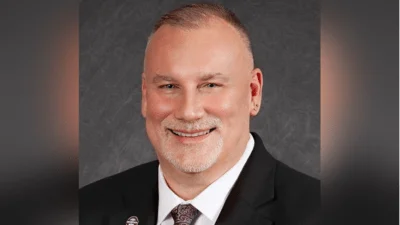Rep. Paul Jacobs (R-Carbondale) | Courtesy photo
Rep. Paul Jacobs (R-Carbondale) | Courtesy photo
In a May 30 Facebook post, Rep. Paul Jacobs (R-Marion) shared information on the audit of the Business Interruption Grant Program.
“An audit of the $585 million Business Interruption Grant program reports checks on the spending 'failed to work as advertised' with insufficient oversight," he wrote on Facebook.
The Business Interruption Grant Program was created "to provide $580 million in economic relief for small businesses hit hardest by COVID-19," according to the Department of Commerce and Economic Opportunity. It budgeted $290 million for childcare professionals and another $290 million for other small businesses. The program's average grant award was $30 million. A list of recipients of these grants can be found here.
In his Facebook post, Jacobs shared a link to a Center Square article focusing on the audit of the Business Interruption Grant program. The Center Square reported that according to the report from Illinois Auditor General Frank Mautino’s office, there wasn’t sufficient oversight for the program, and that there were issues with how the program was administered. The report cited a lack of documentation to explain how organizations that administered the first round of the program were chosen, and that there were grant winners who were not actually eligible for the grants.
In the 126-page program audit report, released on May 24, Mautino laid out several key findings, including that DCEO did not have documentation to explain how/why the organizations selected to administer the first round of the program were actually chosen, and found that a DCEO official and a grant administrator may not have complied with policies regarding conflict of interest.
The small business portion of the grant program started before emergency administrative rules to guide the program were in place, and those rules were not implemented by the time the first round was finished. The findings also note that BIG small grant business applicants self-verified their compliance with laws and reporting on funding, but the DCEO did not verify that information’s accuracy and those applicants received funding regardless of the accuracy or inaccuracy of their compliance and pandemic funding reporting rules.
Another finding revealed that “DCEO failed to monitor that the payment of small business component funding was provided within program guidelines. During our testing we found that in 49 percent (67 of 136) of the cases, the grant administrator failed to provide funding within 14 days of DCEO approval.”
In figures last updated in January, 2021, the DCEO reported that there were 3,597 minority-owned business that received grants (32%), and 3,347 grants to woman-owned businesses. Of the 8,974 grants awarded, 3,747 went to restaurants and bars, and 2,105 went to “other priority and heavily impacted industries.”
Arts and events support service businesses received 535 grants; gyms and fitness centers received 636. Event spaces and performing arts venues received 518 grants, and indoor recreation businesses received 269 grants. There were 61 grants to businesses with more than $5 million in revenue in 2019, and 5,941 (the majority) went to businesses with revenue in 2019 that was under $500,000. There were 3,157 grants awarded in downstate counties that did not receive an allocation of federal funding. Eighty two percent of the grants awarded went to businesses with less than $1 million in annual revenue, and that was 7,381 grants, according to the DCEO document.
Jacobs was elected to represent the 115th House District in 2020. He now represents the 118th House District. He is an optometrist, former owner of the Von Jakob Winery and a Navy veteran.






 Alerts Sign-up
Alerts Sign-up